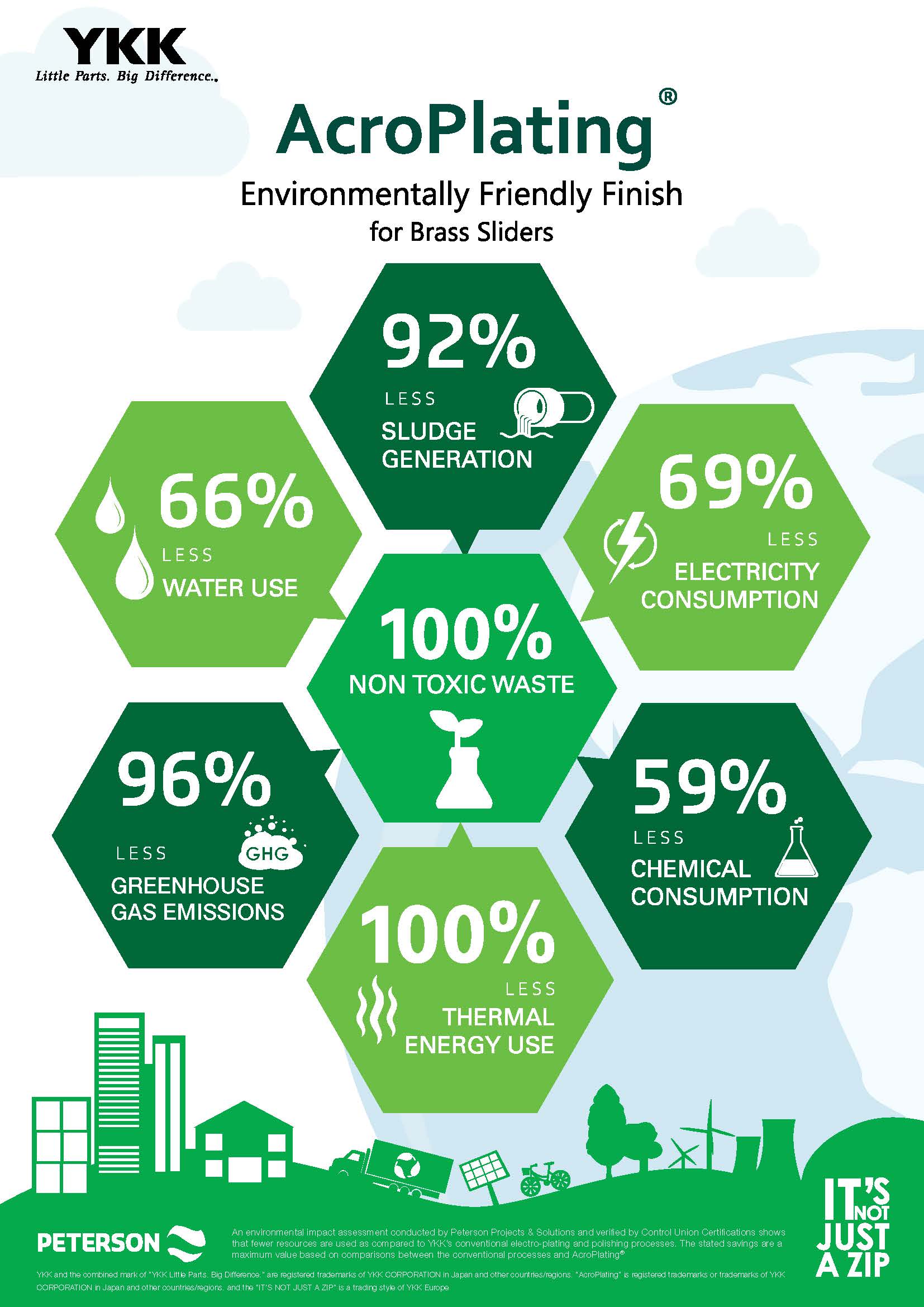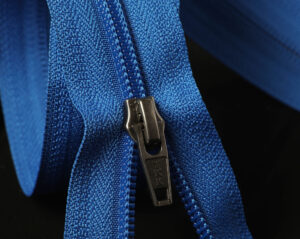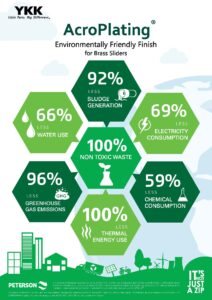 Life Cycle Assessment confirms the elimination of harmful substances
Life Cycle Assessment confirms the elimination of harmful substances
A recent Life Cycle Assessment[1] conducted by the sustainability consulting firm Peterson Projects B.V.[2] confirmed that YKK’s new AcroPlating® technology completely eliminates harmful chemicals, toxic waste, and thermal energy usage, and reduces GHG emissions, water usage, electricity consumption, chemical usage, and sludge generation from the brass plating process.[3] This new technology will allow YKK to create shiny finishes on metal fasteners, such as zippers and snaps & buttons, without the environmental impacts of conventional electroplating.
Conventional electroplating involves the use of large amounts of water and electricity, as well as limited amounts of certain harmful substances. YKK has been working for many years to reduce or eliminate harmful chemicals from the manufacturing process.[4] For example, in 2010 YKK developed an eco-friendly surface finishing that utilizes the base color of materials and does not involve an electrical plating process.
YKK’s new AcroPlating® technology completely eliminates the use of harmful substances such as cyanide, chromium, and selenium from the plating process. Additionally, AcroPlating® reduces greenhouse gas emissions by 96%, water usage by 66%, and power consumption by 69% in the manufacturing process.[5]
YKK developed the AcroPlating®[6] technology in 2019, and in the same year began selling zipper sliders and snaps & buttons made with the technology. Peterson Projects B.V. conducted an LCA of YKK’s snap & button production in 2020 and an LCA of YKK’s zipper production in 2021. These assessments show that AcroPlating® significantly reduces the environmental impact of both YKK’s snaps & buttons and zippers.
“Under our mid-term management vision of ‘Technology Oriented Value Creation,’ YKK is working each and every day on developing new technologies aimed at reducing our environmental impact,” said Hiroaki Otani, President of YKK Corporation. “In April 2021, we established our new Technology Innovation Center to develop the next generation of new technologies and materials. We will continue to cultivate eco-friendly technology, strengthen product development, and help realize a sustainable society as validated by this latest third-party AcroPlating® Life Cycle Assessment.”
AcroPlating® environmental impact reduction data from the Peterson report
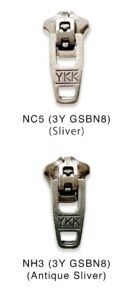 Zipper (slider): YKK Kurobe Manufacturing Center Product
Zipper (slider): YKK Kurobe Manufacturing Center Product
The stated savings are a maximum value based on comparisons between the conventional processes and AcroPlating®. Item assessed was 3Y GSBN8 NH3 (zipper mainly used in jeans and cotton pants).
- Toxic waste: 100% eliminated
- Thermal energy use: 100% eliminated
- Greenhouse gas emissions: 96% reduction
- Water use: 66% reduction
- Sludge generation: 92% reduction
- Electricity consumption: 69% reduction
- Chemical consumption: 59% reduction
Snap & button: YKK Zipper (Shenzhen) Co., Ltd. Product
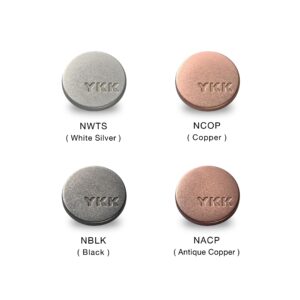 The stated savings are a maximum value based on comparisons between the conventional processes and AcroPlating®.
The stated savings are a maximum value based on comparisons between the conventional processes and AcroPlating®.
- Toxic waste: 100% eliminated
- Thermal energy use: 100% eliminated
- Greenhouse gas emissions: 88% reduction (NCOP)
- Water use: 65% reduction (NCOP)
- Sludge generation: 90% reduction (NBLK)
- Electricity consumption: 60% reduction (NCOP)
- Chemical consumption: 67% reduction (NBLK)
Note: Abbreviations in parentheses indicate the coating type.
YKK constantly demonstrates its leadership in sustainability. It released the YKK Environmental Charter in 1994, which proclaimed “harmony with the environment” as being the highest priority of its business activities. That same year, YKK launched the NATULON® zipper, its first zipper to be made with recycled material. In March 2020, YKK signed the Fashion Industry Charter for Climate Action, which sets the goal for the fashion industry of 30% aggregate reduction in greenhouse gas (GHG) emissions by 2030 and achieving net-zero emissions by 2050. YKK confirmed that commitment in October 2020, with the release of its Sustainability Vision 2050, the company’s roadmap for addressing climate change, material resources, water resources, chemical management and human rights, and aligned its efforts with ten UN SDGs. The story of the Sustainability Vision is told through the company’s Sustainability Journal, which was published in February 2021. In March 2021, YKK’s emissions reduction targets were approved by the independent Science Based Targets initiative (SBTi) as consistent with levels required to meet the goals of the Paris Agreement – limiting global warming to well-below 2°C above pre-industrial levels and pursuing efforts to limit warming to 1.5°C.
On the product front, YKK has innovated with its GreenRise® zipper, which uses plant-based polyester, achieving a 30% reduction in petroleum usage, and its NATULON® Ocean Sourced® zipper, which is made from ocean bound plastic waste. The company recently released a digital showroom where customers can learn more about YKK sustainability initiatives and eco-friendly products.
[1] A methodology for assessing the environmental impact and potential impact of the complete product and process life cycle (raw material extraction, production, consumption, and disposal). Reference standards are ISO 14040 and 14044.
[2] Advisory division of the Peterson Control Union World Group established in 1920. https://www.petersoncontrolunion.com/en
[3] Comparison of the environmental impact of AcroPlating® and conventional methods for the coating process of zipper slider parts.
[4] At YKK, all harmful substances and wastewater used or generated during plating operations are processed and disposed of in accordance with applicable environmental and other laws and regulations.
[5] Comparison of AcroPlating® and conventional methods for 3Y GSBN8 NH3 production at the YKK Kurobe Manufacturing Center.
[6] AcroPlating® is a registered trademark or trademark of YKK CORPORATION in Japan and other countries/regions.

